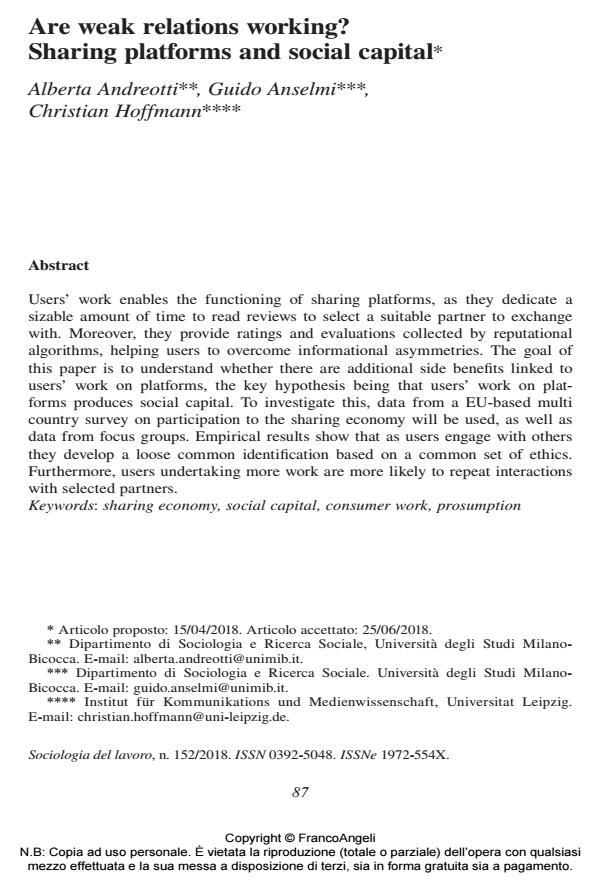Are weak relations working? Sharing platforms and social capital
Titolo Rivista SOCIOLOGIA DEL LAVORO
Autori/Curatori Alberta Andreotti, Guido Anselmi, Christian Hoffmann
Anno di pubblicazione 2018 Fascicolo 2018/152
Lingua Inglese Numero pagine 17 P. 87-103 Dimensione file 110 KB
DOI 10.3280/SL2018-152005
Il DOI è il codice a barre della proprietà intellettuale: per saperne di più
clicca qui
Qui sotto puoi vedere in anteprima la prima pagina di questo articolo.
Se questo articolo ti interessa, lo puoi acquistare (e scaricare in formato pdf) seguendo le facili indicazioni per acquistare il download credit. Acquista Download Credits per scaricare questo Articolo in formato PDF

FrancoAngeli è membro della Publishers International Linking Association, Inc (PILA)associazione indipendente e non profit per facilitare (attraverso i servizi tecnologici implementati da CrossRef.org) l’accesso degli studiosi ai contenuti digitali nelle pubblicazioni professionali e scientifiche
Users’ work enables the functioning of sharing platforms, as they dedicate a sizable amount of time to read reviews to select a suitable partner to exchange with. Moreover, they provide ratings and evaluations collected by reputational algorithms, helping users to overcome informational asymmetries. The goal of this paper is to understand whether there are additional side benefits linked to users’ work on platforms, the key hypothesis being that users’ work on plat¬forms produces social capital. To investigate this, data from a EU-based multi country survey on participation to the sharing economy will be used, as well as data from focus groups. Empirical results show that as users engage with others they develop a loose common identification based on a common set of ethics. Furthermore, users undertaking more work are more likely to repeat interactions with selected partners.
Il lavoro svolto dagli utenti permette il funzionamento delle piattaforme di sharing. Gli utenti non solo leggono le recensioni per selezionare un potenziale partner ma producono recensioni e valutazioni che verranno riaggregate dagli algoritmi di ra-ting. Questi, a loro volta, permetteranno di risolvere le asimmetrie informative, fa-cilitando lo scambio. Lo scopo di questo articolo è comprendere se il lavoro degli utenti produca capitale sociale e di che tipo. Per rispondere a questo interrogativo verranno usati sia un’indagine rappresentativa svolta a livello europeo, sia i risulta-ti di alcuni focus group. I risultati evidenziano che il lavoro degli utenti permette la formazione di una comunità lasca, basata su un’identificazione comune e su una comune etica. Inoltre evidenzia come gli utenti che svolgono maggiore lavoro nelle piattaforme abbiano maggiori probabilità di costituire nuovo capitale sociale in forma di relazione cooperative.
Parole chiave:Sharing economy, capitale sociale, lavoro, prosumption
- The Role of Sharing Mobility in Contemporary Cities Cristiano Inguglia, Martina Di Marco, Miriam Ricci, pp.51 (ISBN:978-3-030-57724-7)
- Handbook of Labor, Human Resources and Population Economics Ivana Pais, pp.1 (ISBN:978-3-319-57365-6)
Alberta Andreotti, Guido Anselmi, Christian Hoffmann, Are weak relations working? Sharing platforms and social capital in "SOCIOLOGIA DEL LAVORO " 152/2018, pp 87-103, DOI: 10.3280/SL2018-152005